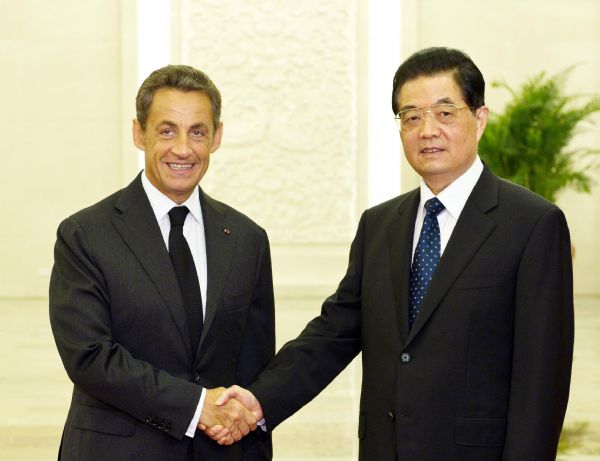Closer ties on agenda as Sarkozy cozies up to China
- By Jiang Shixue
 0 Comment(s)
0 Comment(s) Print
Print E-mail
China.org.cn, September 1, 2011
E-mail
China.org.cn, September 1, 2011
|
|
|
Chinese President Hu Jintao (R) meets with French President Nicolas Sarkozy in Beijing, capital of China, Aug. 25, 2011. [Xinhua] |
Only a few years ago, Chinese people were quite upset about the disruption of the Beijing Olympic Torch Relay in Paris and French President Sarkozy's meeting with the Dalai Lama, an act which violated China's "core national interest". As a result, the 11th China-EU Summit was postponed, and France was not included in Chinese Premier Wen Jiabao's "tour de Europe" in January 2009.
Now, both China and France are happy to see the warming of bilateral relations between the two nations. Out of the six visits Sarkozy has made to China as French President, two were made in 2011, including the 5-hour trip to Beijing on the afternoon of August 25.
Sarkozy's short visit to Beijing was made during his trip to New Caledonia. Exactly what Sarkozy discussed with Chinese President Hu Jintao is anyone's guess. From what is happening around the globe, however, we can infer that the two leaders might have discussed the following issues:
1. The debt crisis in Europe. To the great surprise of many people in China as well as in other parts of the world, the crisis has persisted for almost two years, and, despite the efforts of the EU, there is still little light at the end of the tunnel. China has helped Europe by purchasing bonds and making investments. It is likely that President Sarkozy asked China to continue to assist Europe as it battles the ongoing crisis.
According to the media, President Hu Jintao told President Sarkozy that China is monitoring developments in the debt crisis and hopes that the Euro zone will soon be stabilized. The Chinese leader also promised to designate Europe as a major investment market. It follows, then, that he would want to ensure that Chinese investments are properly protected.
2. France's G20 Presidency. France will host the G20 Summit in Cannes on November 3-4, 2011. France hopes that the summit will achieve the following objectives: setting indicators to monitor global economic imbalances; reforming the international monetary system; strengthening financial regulation; combating commodity price volatility; supporting employment and strengthening the social dimension of globalization; improving global governance; and acting for development. In order to ensure the success of its presidency, France needs help from other members, including China and other emerging economies, which have grown in importance on the global stage.
3. The Libya crisis. Gaddafi is doomed to fall in the face of both a strong rebel force and NATO-led bombing. Before the drama erupted in Libya, China had invested heavily in the oil-rich nation. The conflict has therefore resulted in substantial losses for China. Now that the crisis appears to be reaching its end, China wishes to see its investment in Libya bear fruit once more.
As a matter of fact, China can play a certain role in the reconstruction of Libya, although it abstained from voting on a draft resolution which authorized a no-fly zone over Libya and called for "all necessary measures", excluding troops on the ground, to protect civilians under threat of attack in the North African country. It is reported that France, along with other countries that took part in the bombing campaign, would like to see China making its own efforts to rebuild Libya.
Sarkozy's five-hour trip to Beijing was regarded as a success by the international media and commentators. An article published by EUFNET asked this interesting question: "Why is China such a draw for both European and American leaders?" One explanation EUFNET gives with regard to Sarkozy's visit is his intention to remind China that "you should not forget Europe when you move so close to the U.S."
Sarkozy might not be that jealous. But one thing is certain: his visit reflects the importance of Sino-Franco strategic ties. Needless to say, closer cooperation with a rising China is in Europe's interest.
France formally recognized the People's Republic of China in 1964. Bilateral cooperation and exchanges have covered all areas over the years and France has now become China's fifth-largest trading partner in the EU.
Bilateral relations are, by definition, a two-way street. As Hu Jintao told Sarkozy during the latest meeting on August 25, stronger links and cooperation between China and France will play an important part in pushing forward positive results from the G20 summit, as well as boosting international economic cooperation and promoting the sound recovery of the world economy.
It is interesting to recall what China and France said in their Joint communiqué issued on April 1, 2009: "The two parties take the view that in the present political and international economic situation marked by far-reaching changes, France and China, permanent members of the United Nations Security Council, shoulder heavy responsibilities when it comes to maintaining global peace and promoting development. The two parties stressed their readiness to strengthen their dialogue and cooperation in order to address such global challenges as the international financial crisis."
Indeed, the Chinese Panda and the French Rooster should understand each other, respect each other, hug each other and love each other.
The author is a columnist with China.org.cn. For more information please visit http://www.china.org.cn/opinion/jiangshixue.htm
Opinion articles reflect the views of their authors, not necessarily those of China.org.cn.







Go to Forum >>0 Comment(s)